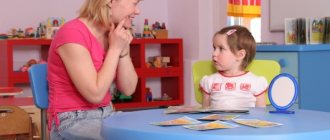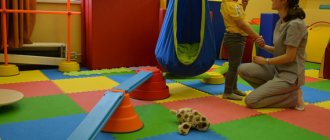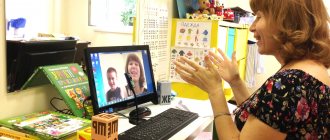Young parents, observing the development of the baby, eagerly wait for him to speak. Sounds appear first, then syllables are formed. Only then do the words appear. The little one is already babbling sweetly in his own language. But it turns out that by this age my friend’s son was naming objects and speaking in phrases. This worries some parents. What to do? Wait for it to “talk”? Should I go to a speech therapist? Let's find out.
The diagnosis of “delayed or impaired speech development” can only be made by a doctor. Neither the experience of friends nor discussions on the forum should become the basis for final conclusions. However, parents should know the main stages of speech development. It is important not to miss the situation when you really need to contact a specialist.
Signs of normal speech development
Speech is a tool of communication. The formation of the speech apparatus is closely related to mental development and the acquisition of life experience. A child learns to speak by copying adults. Mom's songs, jokes, and reciting actions contribute to the development of speech. But cartoons, on the contrary, slow down the process. Children should be involved in dialogue, not just listen or look at pictures.
If a baby hears speech from birth, then by 12 months he will have mastered the following skills:
- Humming is a drawn-out pronunciation of vowel sounds and syllables: ga, ba, ua.
- Babbling is the repeated repetition of one syllable: mamama, bababa, dadada.
- The first words consisting of simple syllables: mom, dad, baba.
- Complex words may appear, pronounced in your own way. Makaya is small, deka is a girl.
A child's active vocabulary should look like this:
- 1.5 years – 20-40 words;
- 2 – 50-200;
- 3 – 800-1000;
- 4 – 1600 – 1900;
- 5 years – 1900-2200.
You need to realize that the concept of norm is relative. But focusing on the speech therapy calendar, it is easier to track how children’s speech development is progressing.
Simple physiological problems
Speech deficiencies in preschoolers are usually not serious. Most children with pronunciation problems learn the correct sounds by the early school years, when they have better control of the muscles involved in speaking. Various rhymes and tongue twisters help here well. Thus, speech therapists advise reading the longest tongue twister in Russian, “Liguria,” every day in order to hone your diction skills to perfection.
A pediatrician and pediatric dentist can help rule out physiological problems, including dental defects, that can cause defects and general speech impairment. Sometimes the solution is as simple and natural as the appearance of permanent front teeth in a preschooler. If there are no physiological reasons, and speech does not appear until the age of 2.5-3 years (at least simple phrases of 2-3 words), consultation with a specialist is necessary.
Recommended age to visit a specialist
A specialist who works with speech defects is called a children's speech therapist. Observe before making an appointment.
- If you see that a baby under one year old understands speech addressed to him, hums, and babbles in response, development is proceeding correctly.
- At 1.5-2 years old, phrases and simple sentences appear.
- At 2-3 – the little person actively communicates with peers, enriching his vocabulary.
- At 3, he masters whistling sounds, and at 4, hissing sounds.
- The pronunciation of complex R and L is established at 5-6 years.
- A child over 6 speaks words clearly, constructs sentences freely, and composes a story.
If you notice any deviations, consult a specialist. It makes sense to go to a speech therapist no earlier than 2 years. Be sure to visit your doctor before school.
Let us consider the features of speech development in preschoolers in more detail.
1 YEAR
From one to two years the baby masters about 20-60 words. They have the meaning of sentences: they name objects, people or actions (mother, give, na). The baby learns complex words, which he names in his own way: “mako” - milk. Speech therapists say not to correct mistakes, but to correctly name the desired object themselves, repeating after the child. For example: “What will you drink? Milk?".
2 YEARS
From 2 to 3, speech improves noticeably. Simple words are replaced by complex ones. Children begin to use sentences consisting of several words. The baby is more often asked questions: “Why?”, “Where?”. Adjectives, prepositions, and conjunctions appear. Speech becomes expressive and grammatically correct. Slurred pronunciation may persist. The baby skips letters or switches syllables. He speaks sometimes correctly, sometimes incorrectly, and sometimes prefers to remain silent altogether.
3 YEARS
From 3 to 4 years old, children's active vocabulary becomes more extensive. By this age, kindergarten or development school occurs, and communication with peers is added.
New sounds appear that the baby could not pronounce correctly before. The child learns to use verbs and adjectives. Agrees them with nouns. Skillfully uses pronouns, knows the concept of gender and number. By the age of 4, children master general terms: dishes, clothes, animals. They can give an assessment: good, beautiful, clean. Able to notice errors in pronunciation among peers.
4 YEARS
From 4 to 5 years of age, speech continues to improve. The four-year-old speaks coherently and is able to tell a short story. The words in the sentence agree almost without errors. There may be difficulty forming plurals. For example: pencil - pencils, mirror - mirrors. If an adult suggests the correct option, the baby will easily remember. Children begin to “play” with sounds. They come up with rhymes, sing songs, learn poems. Able to remember and correctly say last name, first name, patronymic. By the age of five, children actively communicate, speech development is in full swing.
5 YEARS
At the age of 5-6 years, a qualitative leap in development occurs. Children are able to tell not only stories from life, but also retell short stories and describe pictures. There are fewer mistakes, and more complex words and sentences. It turns out to pronounce R and L - the most difficult sounds. Sound pronunciation is clear and correct.
6 YEARS
By the age of six, the speech apparatus is almost completely formed. Children are preparing for school, where they will have to master reading and writing. At this age, parents are required to pay close attention to speech. The child must speak coherently and clearly. If speech defects are observed, it is necessary to bring the baby to a speech therapist.
Rules for visiting a speech therapist
The child should be taken to a speech therapist for the first time in the third year of life. If there are deviations in speech development before the age of 3, then consultation with a specialist will be required earlier. Preventive examinations of healthy children by a speech therapist should be carried out once a year. They are held from 3 to 7 years of age. It is better to bring a preschooler to a consultation immediately, so that if deviations are identified there is enough time to eliminate the defect, especially in children 5-7 years old.
Routine examinations by a speech therapist should not be ignored. They will help to promptly identify violations of sound pronunciation and prepare the child for school in time. If you apply late, the disorders may persist and complicate social adaptation.
During classes they use games, skits, poems, cards with pictures, letters, speech therapy massage and gymnastics. Group classes are actively practiced. The duration of work with a speech therapist is 15-20 minutes. It is important not only to study in the speech therapist’s office, but also to do homework. A speech therapist must work with parents and give advice on homeschooling.
Memo for parents
To get your child talking, you need to follow the advice of experts.
- Be an example. Speak correctly, legibly, call things by their proper names. Enrich your vocabulary. Don't be afraid to use difficult words, but don't forget to explain their meaning.
- Do not overuse the pacifier.
- If the baby prefers to remain silent, although he can explain himself in words, stop understanding gestures and facial expressions for a while. Follow the request if the child uses speech.
- Avoid baby words, especially if the child is over 2 years old. Let it be better to have a car than a Bibika. The baby will quickly master the correct pronunciation.
- Correct mistakes gently. Don't scold for incorrect pronunciation, don't tease, don't laugh.
If you see a significant violation of speech development, contact a speech therapist. The specialist will invite you to a speech therapy session or tell you how to practice on your own at home. Speech development classes are also held in kindergartens.
Why is a speech therapist needed?
Why do you need a speech therapist? A speech therapist is a specialist who helps to formulate speech correctly and diagnoses the state of speech function. To determine defects, he conducts the necessary tests - this process is called a speech therapy examination.
After the examination, the specialist draws up a speech therapy report, where he writes about the presence or absence of speech dysfunction. The card records sounds that are poorly pronounced by the child, omissions of letters, their replacement, rearrangement, and the presence of violations of speech tempo (fast, slow, stuttering). If the patient has pathologies, the speech therapist will refer you to specialized specialists. Often, a child with speech changes requires consultation with doctors: a neurologist, psychologist, otolaryngologist. If there are brain diseases or other pathologies that impair speech function, the patient takes a course of medications, after which corrective classes are carried out.
After drawing up a speech therapy report, the specialist prescribes a lesson plan. They can be carried out in the office of a speech therapist-teacher, kindergarten, or at home. Sometimes a small patient with severe deviations is sent to special kindergartens that correct speech. A speech therapist can work individually or conduct lessons with a group of children. Group lessons have an advantage over individual ones, as they provide the opportunity to teach a preschooler to hear other children’s pronunciation errors, allow them to pronounce sounds, and form words and sentences properly.
A speech therapist at a preschool institution (preschool) shapes the sound pronunciation of pupils. A speech therapy specialist trains teachers in the correct correction of speech disorders, organizes classes, games, and events with a speech therapy focus. The well-coordinated work of staff under the guidance of a speech therapist makes it possible to improve the quality of speech and eliminate existing defects in kindergarten students.
When to expect results and what to do if there are none?
The results of sessions with a speech therapist are individual. Each child has its own characteristics and pace, and much, of course, depends on the specialist. After the first meeting with him, you shouldn’t expect that your baby’s tongue twisters will start flying off his teeth. Improvement in speech may come quickly, but it’s okay if it happens a little later. We need to focus on the fact that, in principle, progress must occur.
If nothing happens at all for a long time, then this is a reason to look for the reason.
She may be:
- anatomical, for example, a short frenulum - then you need to contact a dentist;
- psychological (due to a tense situation in the family, developmental characteristics) - to a psychologist, neuropsychologist;
- with hearing – see an audiologist.
We reached the audiologist. What's next?
Working with a specialist always begins with an initial consultation.
At the appointment, an examination of the auditory system is carried out so that the cause of the disorder or hearing loss (if any) can be accurately determined.
One of the most important studies is pure-tone audiometry, with its help you can clearly see, on a graph, hearing thresholds: what are the quietest sounds a child perceives. This helps in selecting and adjusting a hearing aid so that the baby can finally hear all the sounds and speech of others in full.
Then the stage of team work begins - classes with a teacher of the deaf on the correct development of the speech apparatus, which has not been working at full capacity for a long time, and the production of recently heard sounds that are actually new to the baby. A speech therapist can also help hone your skills; there is no need to discount this specialist.










